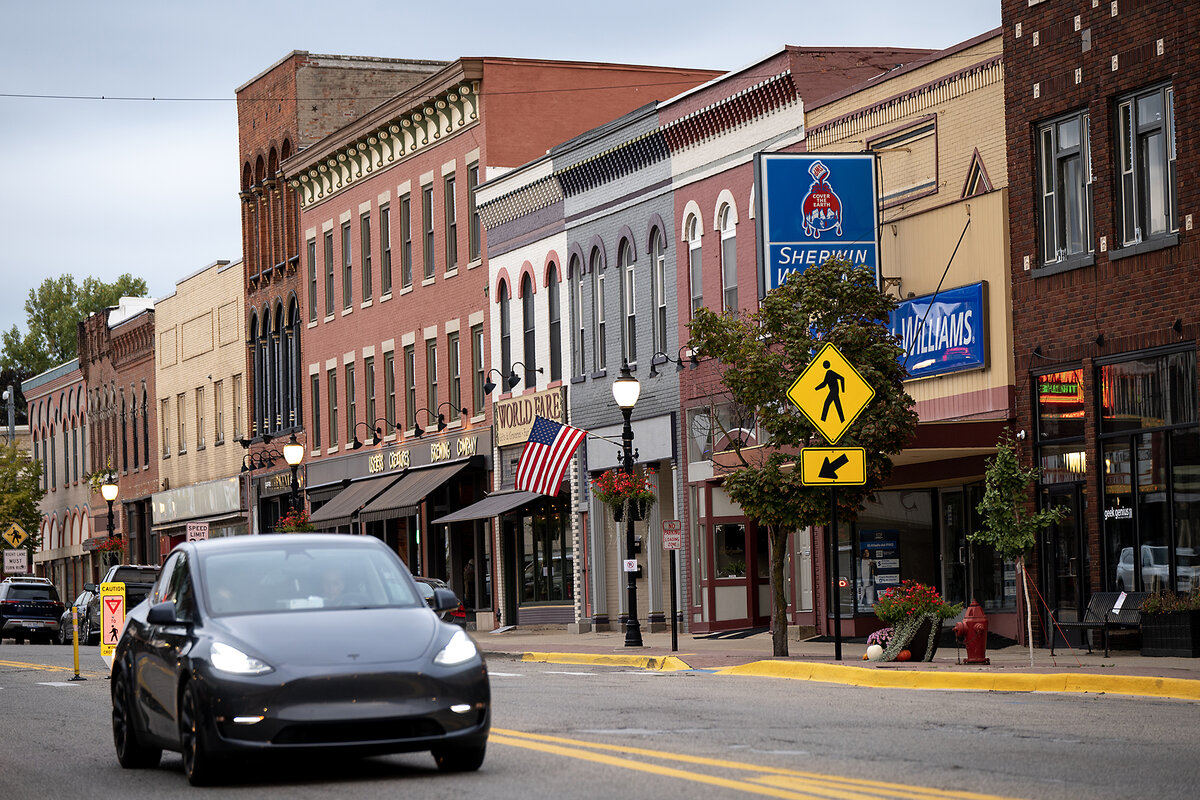Copyright csmonitor

At the polls on Tuesday, voters signaled concerns about the U.S. economy and about how the Trump administration has steered it in the first nine months of President Donald Trump’s second term. The nation’s cautious economic mood, which led to Democratic victories in several states, extends beyond this year’s election battlegrounds. Before the election, the Monitor gauged the economic climate by speaking with city officials, chambers of commerce, and business owners in Michigan, a prominent swing state in recent presidential elections. We visited three very different towns – rural Three Rivers, industrial Battle Creek, and booming Orion Township – to ask about the challenges and opportunities that citizens there are facing. The interviews weren’t probing for personal political positions. Still, two themes emerged: cautious optimism about the economy and deep concern that the tariffs now in place are dragging on growth. Beyond the tariffs, many local leaders and employers worry that the ongoing government shutdown, now 38 days old, would erase the gains they had made. All felt their own local leaders had a better feel for local sentiment than the leadership in Washington. Each of the cities the Monitor visited has its own story, and its own challenges: In Three Rivers, a small, mixed agricultural and manufacturing town reflects the rises and falls of the national economy; in Battle Creek, big changes for a major employer adds uncertainty; and in Orion Township, tariffs cloud the bright future as a new auto assembly plant comes to town. Three Rivers: Navigating a “down” economy Surrounded by agricultural lands, Three Rivers has a more complex economy than might appear at first glance. The top employer, for example, is an auto parts plant, American Axle. Much of the nearby farmland was sold off long ago to large agricultural companies, which buy tractors, fertilizers, pesticides, and seeds from larger suppliers rather than local mom-and-pop stores. There are good-paying jobs in Three Rivers, and the city has an industrial, blue-collar feel, with its fortunes rising and falling with the overall national economy. “Southwest Michigan is pretty stable, but super tertiary,” says Jamie Clark, president and owner of Clark Logic, a real estate and third-party logistics company based in nearby Portage. With a fleet of 70 trucks and 7 million square feet of warehouse space scattered across Michigan and northern Indiana, Mr. Clark says diversification is the key to his success. “If the auto industry is down, then you hope that the RV industry is up,” he says, noting that Three Rivers has small manufacturing plants for both autos and recreational vehicles. Tariffs might hurt farmers, given how much of their produce is shipped abroad. But there are signs that some manufacturing will be brought home to Michigan. “If I modeled everything based on economics, I would probably still have one building in Three Rivers rather than 100,” Mr. Clark says. “I run with my gut. I don’t know any other way.” Out on U.S. Highway 131, Chris McGuire can tell when the economy is up or down by how many people are buying his sheds. “This area is down because it’s reliant on agriculture,” says Mr. McGuire, owner of McGuire’s Big Boyz Toyz LLC, which sells portable sheds, greenhouses, and chicken coops. “On this road, there are several other shed sellers, but a lot of their lots are only about one-third full.” Mr. McGuire says he feels like the federal government doesn’t care about what happens in small-town America. Yet, federal policies can have a major impact on the lives of rural Americans. “You get these tariffs, and that drives up prices,’’ he says. “And you have interest rates, they are so high people can’t buy a house.” While he worries about other local people struggling with inflation and stagnant wages, he says that his own company is doing well. This year, sales are up 30% compared with last year. “I go to people’s homes. I shake people’s hands. I’m a one-stop shop,” he says. “Even then, it is a struggle because of the financial burden of keeping an office here. Every year, I have to contemplate: is it really worth it?” Battle Creek: Headwinds from tariffs, shutdown Home of the WK Kellogg Co., Battle Creek has long been known as “Cereal City.” The Kellogg name is everywhere: there is the Kellogg Arena for sports events, a Kellogg Community College, Kellogg High School, and even a Kellogg Air National Guard Base. So, when the Italian candy-maker Ferrero announced an agreement in July to buy WK Kellogg Co., it came as a gut punch to this community. Ferrero has assured city leaders that they will maintain Kellogg’s headquarters in Battle Creek for at least one year, says Mayor Mark Behnke. They have also said they will look for ways to upgrade and expand the product lines coming from Kellogg’s production facilities. But no matter what happens, Kara Beer, president of the Battle Creek Area Chamber of Commerce, is not worried. She says that Battle Creek has much more going on than just cereal and notes that Denso, a Japanese auto parts manufacturer, is the top employer – not Kellogg’s. Beyond that, she says, a local Viking-Cives plant makes snow plows and ice-control equipment, there’s a strong small-business sector, and a new Ford electric-vehicle battery plant is coming to town. One primary concern for business owners here is the damage that threatened tariffs might bring. President Trump has imposed tariffs on U.S. trading partners, including China, Canada, Mexico, and the European Union, covering everything from automobiles and heavy trucks to steel, aluminum, lumber, semiconductors, pharmaceuticals, and copper. The Tax Foundation estimates that tariffs will amount to an average tax increase of $1,300 per U.S. household in 2025. At the Fort Custer Industrial Park, 67 of the 89 companies there are internationally owned, Ms. Beer says. “When you start these tariffs, that is going to have a major impact.” These international firms bring in foreign parts to manufacture goods in Battle Creek, and they will now have to pay higher customs duties. “Add in tariffs, and one week you may be paying $21 for parts and next week you are paying $28, and, of course, they will have to adjust their prices.” The continuing government shutdown is another concern. A significant number of federal workers at the Air National Guard Base and the Fort Custer Training Center are now working without pay, which means many are not spending money at restaurants or other area businesses. “They don’t know when their next paycheck is coming,” Ms. Beer says. “We are all trying to be hopeful that the shutdown will soon end. But the longer it goes on, the longer it takes to recover from the effects of the shutdown.” Orion Township: Seeing a “positive” for the economy Unlike Battle Creek, a small industrial city with a proud industrial past, Orion Township is a leafy Detroit suburb with an auto assembly plant poised to expand. General Motors announced in June that it was investing $4 billion to reconfigure its Orion Assembly Plant to build gasoline-powered trucks and SUVs including the Cadillac Escalade and the Chevrolet Silverado. The decision followed a three-year charm offensive by township leadership, led by supervisor Chris Barnett. Three years ago, GM was considering shutting down the assembly plant, which at the time was producing electric vehicles such as the Chevy Bolt. But Mr. Barnett met with GM leadership and promised to do everything possible to keep the automaker. “We told them we were going to make this a really smooth process,” he says. This included a 15-year tax abatement and greater flexibility in bureaucratic procedures. The result: GM will double the size of its facility and create more than 3,000 jobs, Mr. Barnett says, with an estimated 2,000 more new positions in support companies that manufacture car seats, bed liners, and related products. All those jobs are good news for Tony Battaglia, owner of several local restaurants, including Palazzo di Bocce, which features its own bocce courts. “That assembly plant will bring in the people, and you can see it in the housing market,’’ he says. “It’s a real positive for the local economy.” When he looks to the national level, Mr. Battaglia says, “I hear from business guys around me, they seem more optimistic now, more than six months ago.” But he acknowledges that tariffs make people a little nervous. “Tariffs are a mixed bag, but if they can finally bring our money back from China, where they have been stealing from us for years, hopefully, it will keep getting better.” Deni Bozinovski, another restaurateur in Orion Township, says that the ongoing work to enlarge the GM assembly plant is great news, and his own sales are already up 10%. But, Mr. Bozinovski says, the overall market is “stagnant.” “A lot of people are scared right now,” he says. “They’re scared to spend on luxuries, and for many people, going to restaurants is a luxury.” The biggest pinch for young families is the cost of housing. “These young couples in their 20s, looking at houses in the $300,000 or $400,000 range, with 8% interest rates, how are they supposed to buy a home? Things are tight. If you have a husband and wife, and they both have to bring in an income, it’s really hard.” Mr. Barnett, the township supervisor, says that local and state leaders are finding common ground in solving problems, such as the need for affordable housing. What worries him more is hyperpartisanship at the national level, and what he calls the “herky jerky” policies on tariffs. “I’ve heard directly from some of our Tier 1 and Tier 2 suppliers. That’s what keeps them up at night,” Mr. Barnett says. “I don’t have a problem with tariffs if it’s well thought out. We can’t prepare our employers and job creators for the uncertainty.’’ “They look to us for answers,’’ he adds. “And we don’t have them.”



